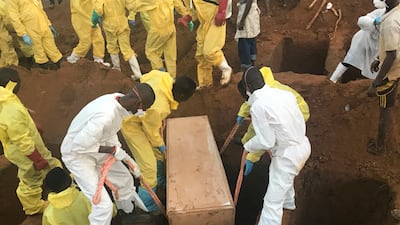More than 400 bodies have been pulled from the debris of Sierra Leone's mudslides and another 600 people were still missing as burials and recovery efforts continued on Friday amid the threat of further disaster.
The Red Cross put the death toll at 409 after the flooding and mudslides in the West African nation's capital, Freetown, on Monday morning.
"The death toll is climbing by the day," said Elhadj As Sy, secretary general of the International Federation of Red Cross and Red Crescent Societies.
Large-scale burials have begun as an estimated 600 people remain missing. People continue to search through tonnes of mud and debris amid the remains of mangled buildings. Thousands of people have lost their homes.
Mr Sy said the disaster was "way beyond the capacity of the government alone".
The government has warned residents to evacuate a mountainside where a large crack has opened. Rainfall is forecast for the coming days, slowing recovery efforts and bringing the threat of further mudslides.
The main focus is getting people away from areas still under threat, said Zuliatu Cooper, the deputy minister of health and sanitation.
"The rains are still pending and there is a possibility that we will have another incident," he said.
________________________________________________
Read more:
President Sheikh Khalifa orders urgent relief for Sierra Leone
How Sierra Leone is rebuilding after the disaster of Ebola
_________________________________________________
Some critics accuse the government of not learning from past disasters in a city where many poor areas are near sea level and lack good drainage. The capital is also plagued by unregulated construction on its hillsides.
The government hired 600 gravediggers for burials in a cemetery that holds victims of the 2014-15 Ebola outbreak that killed thousands in the country.
President Ernest Bai Koroma joined mourners for burials on Thursday. Many people have been unable to find loved ones as many victims were too mangled and decomposed to be identified, but the government has vowed to hold respectful burials for all.
"The water took away my mother and sister and they have buried them today. That's why we are here, to mourn and go back home," said one survivor, Zainab Kargbo.

